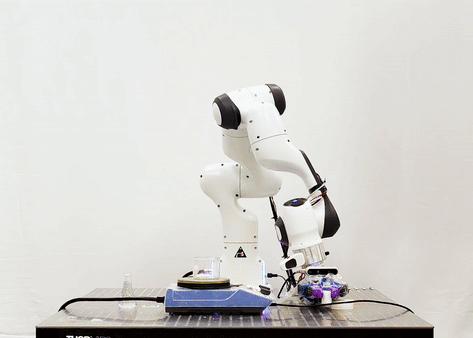Meet the postdocs–and then apply to join them by Jan 27!
The Acceleration Consortium’s (AC) second call for postdoctoral fellows is now open, with applications due on January 27, 2023, by 5:00pm EDT. Based at the University of Toronto, the AC is a global community of academia, government, and industry who are accelerating the discovery of new materials and molecules needed for a sustainable future.
Subscribe to our mailing list, visit our website, or follow us on Twitter and LinkedIn.
A robot (pictured above) assists a chemist in the lab. By handing off a wide range of tasks to this general-purpose robot, the chemist can avoid many laborious, time-consuming, and often dangerous lab experiments. The system can load high-level descriptions of chemistry experiments, perceive a workspace, and autonomously plan the required actions and motions to perform the given chemistry experiments with common tools found in the existing lab environment.
This work is a collaboration between Acceleration Consortium (AC) members Animesh Garg, Florian Shkurti, and Alán Aspuru Guzik. Among the team is also AC postdoctoral fellow (PDF) Kourosh Darvish, who is part of the AC’s very first PDF cohort, which began in 2022.
The second call for AC fellows is now open, with applications due on January 27, 2023, by 5:00pm EDT. To review the complete guidelines and explore this year’s PDF themes, press the button below.
The program is designed to support high-risk, high-reward research in accelerated materials and molecular discovery and provides up to $70,000 per year in salary support along with $5,000 for lab consumables for 2 years (May 1, 2023 – April 30, 2025).
Each AC fellowship must represent a new collaboration between at least 2 AC members (hosts), one of which must have a faculty appointment at the University of Toronto (U of T). While fellows are based at U of T, the aim is to encourage collaboration between AC members in Toronto and the extensive network of principal investigators (PIs) around the world. To view a complete list of current members and their contact info, please visit: acceleration.utoronto.ca/researcher.
The inaugural cohort also includes Hooman Chamani, an AC postdoctoral fellow working with AC members Jay Werber and Jason Hattrick-Simpers. Hooman's research focuses on membrane materials, with a particular focus on porous membranes used in water treatment and desalination.
Water scarcity is a widespread and increasingly pressing global challenge. Membrane-based desalination processes, especially reverse osmosis (RO), are the most energy-efficient and (often) cost-efficient processes for the treatment of saline waters. However, membrane design and characterization limitations presently prevent the use of RO for the treatment of hypersaline brines. Hooman uses artificial intelligence (AI) to reconstruct statistically equivalent 3-D membrane structures of membranes using 2-D images, which has the potential to revolutionize membrane characterization and consequently accelerate the discovery of membranes needed for a sustainable future.
The third AC PDF is Salatan Duangdangchote, who works with Alex Voznyy and Dwight Seferos on next-generation batteries. By developing more robust machine learning (ML) models, this research aims to screen the entire periodic table for battery candidates, and then synthesize the best-predicted materials.
Advancing ML methods is critical for this area, since available ML models typically only work well with large high-quality datasets but fail to generalize if trained on smaller data. This is particularly an issue for Li conductors, which have great potential to enable the solid-state battery era, but currently lack quality data. While better data can be generated, there are high associated computational costs, so the ability to develop ML models that rely on less data would be transformational.
Do you have a bold idea that will help us secure a healthier, more sustainable future–now? Apply to be part of this year’s cohort of six postdoctoral fellows with the Acceleration Consortium.



